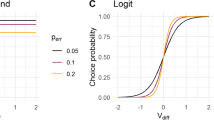Abstract
We introduce a particular way of drawing the distinction between the use of theory and simulation in the prediction of people's decisions and describe an empirical method to test whether theory or simulation is used in a particular case. We demonstrate this method with two effects of decision making involving the choice between a safe option (take amount X) and a risky option (take double the amount X with probability 1/2). People's predictions of choice frequencies for trivial (€ 0.75) as opposed to substantial (€ 18) amounts in Experiment 1 are quite accurate when they are presented with both conditions juxtaposed but are less accurate when only given one of the conditions. This result is interpreted to speak for the use of theory in prediction. In contrast people's predictions of the framing effect for substantial amounts (more risk seeking for positively than negatively framed problems) are accurate only for independent predictions but not for juxtaposed predictions, which speaks for the use of simulation.
Similar content being viewed by others
References
Churchland, P.M. (1981) Eliminative materialism and the propositional attitudes.Journal of Philosophy, 78, pp. 67–90.
Davies, M. & Stone, T. (1998) Folk psychology and mental simulation, in A. O'Hear (Ed.),Current Issues in the Philosophy of Mind, Supplement 42 (Cambridge, Cambridge University Press).
Davis, M. & Stone, T. (in press) Mental simulation, tacit theory, and the threat of collapse,Philosophical Topics.
Fodor, J. (1987)Psychosemantics (Cambridge MA, TheMit Press).
Gordon, R.M. (1986) Folk psychology as simulation,Mind & Language, 1, pp. 158–71.
Grether, D. & Plott, C. (1979) Economic theory of choice and the preference reversal phenomenon,American Economic Review, 69, pp. 623–38.
Heal, J. (1986) Replication and functionalism, in J. Butterfield (Ed.),Language, mind, and logic (Cambridge, Cambridge University Press).
Heal, J. (1995) How to think about thinking, in M. Davies & T. Stone (Eds),Mental simulation (Oxford, Blackwell).
Heal, J. (2001)Other minds, rationality and analogy, inaugural address, St. John's College, Cambridge University.
Kühberger, A., Schulte-Mecklenbeck, M. & Perner, J. (2002) Framing decisions: Real and hypothetical.Organizational Behavior and Human Decision Processes, 89, pp. 1162–75.
Levin, I.P., Chapman, D.P. & Johnson, R.D. (1988) Confidence in judgments based on incomplete information: An investigation using both hypothetical and real gambles,Journal of Behavioral Decision Making, 1, pp. 29–41.
Nichols, S., Stich, S., Leslie, A. & Klein, D. (1996) Varieties of off-line simulation, in P. Carruthers & P.K. Smith (Eds),Theories of Theories of Mind (Cambridge, Cambridge University Press), pp. 39–74.
Paese, P.W. (1995) Effect of framing on actual time allocation decisions,Organizational Behavior and Human Decision Processes, 61, pp. 67–76.
Perner, J., Gschaider, A., Kühberger, A. & Schrofner, S. (1999) Predicting others through simulation or by theory? A method to decide,Mind & Language, 14, pp. 57–79.
Stich, S. & Nichols, S. (1995) Folk psychology: simulation or tacit theory?, in M. Davis & T. Stone (Eds),Folk psychology (Oxford, Blackwell), pp. 123–58.
Tversky, A. & Kahneman, D. (1981) The framing of decisions and the psychology of choice.Science, 211, pp. 453–8.
Wiseman, D. & Levin, I. (1996) Comparing risky decision making under conditions of real and hypothetical consequences,Organizational Behavior and Human Decision Processes, 66, pp. 241–50.
Author information
Authors and Affiliations
Corresponding author
Rights and permissions
About this article
Cite this article
Perner, J., Kühberger, A. Framing and the theory-simulation controversy. Predicting people's decisions. Mind & Society 3, 65–80 (2002). https://doi.org/10.1007/BF02513148
Received:
Accepted:
Issue Date:
DOI: https://doi.org/10.1007/BF02513148




